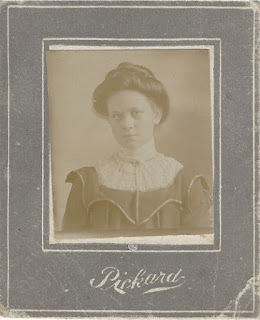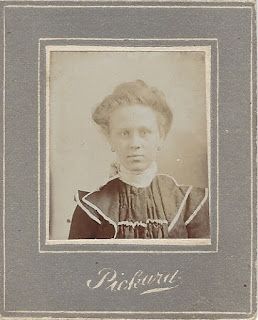In the picture, the girls wore very similar dresses and both wore their hair pulled up on top of their heads in the Gibson Girl style. Did their dress just reflect the current style for young girls, or did they have the same taste? Perhaps we see the common tendency of a younger sister to imitate the dress and style of an older sister.
 |
| Gussie (Fricks) Brummitt |
 |
| Bertha (Fricks) Lamb |
I wonder if they were close. Not having any sisters of my own, I used to think about how wonderful life would be if only I had a sister. I imagined that we would play together, share each other’s clothes and at night, when we were supposed to be asleep, we would giggle and whisper secrets in the room that we shared. As much as I loved my brothers, I knew that having brothers was not the same deal. I would like to think that Bertha and Gussie had a close loving relationship, although I don’t really know.
In my research, I could see other similarities between the two girls. They married within two years of each other and both married in Walker County, Georgia. Interestingly enough, both girls married men quite a bit older. Gussie married a man 10 years her senior and Bertha’s husband was nearly 7 years older than she was. Each had only one child, a son. (I shared Gussie’s story here.)
Whatever similarities existed between the two girls, there were also some striking differences. At the young age of 16, Bertha married Sam Lamb on the 22nd of July 1900. Although several years older, Gussie actually married two years after Bertha. Bertha and Sam’s son, Jesse Wallace Fricks, was born about 1902. Gussie and her husband John Brummitt would have a son three years later.
The most striking difference though was the length of Bertha’s life which sadly was considerably shorter than Gussie’s.
Bertha didn’t live long enough to appear on a single census with her husband and son. Dying before her son Jesse was two years old, she missed out on so much. She didn’t experience growing old with her husband, nor seeing her son Jesse marry and have children. She never knew the joy that grandchildren bring.
Sadly no death certificate exists for her and not even a Find-A-Grave entry helps identify where she was laid to rest. Thankfully, a short article appeared in the Walker County Messenger, a newspaper for LaFayette, Georgia. The following entry was published on Thursday February 26, 1903:
“On the 14th inst. while the shades of night hung over our sleeping valley the angel of death entered the home of Mr. Sam Lamb and snatched from his bosom his dear wife. Two short summers ago she stood by his side a beautiful blushing bride full of life and vigor; but soon the much-dreaded monster, consumption, with its cold hands laid hold of her body and finished its deadly work. The deceased was the daughter of Mrs. Ramsey Fricks. In this, the saddest hour of their lives, we offer sympathy and trust that the Good Master will at last lead the bereaved to a sweet home where no sad farewells are heard.” (1) J.B. Cagle
Only 18 years old and with so much ahead of her, Bertha succumbed to the awful disease, consumption, known today as tuberculosis. She left behind her husband of two years and her young son. Two sisters and two stories, but one story was much too short.
(1) LaFayette Georgia Walker County Messenger 1902-1905, image 218, February 23, 1903. Accessed on Old Fulton New York Post Cards, October 24th, 2015.
Copyright © Michelle G. Taggart 2015, All rights reserved

Goodness – that's a humdinger of an obituary!
I imagine Gussie missed her sister terribly.
"while the shades of night hung over our sleeping valley"…wow, what a wordsmith who wrote that. Such a sad story, repeated all too often. You told it well, Michelle!
How sad and tragic for Bertha's family!
My great-grandmother succumbed to Tuberculosis at a young age as well, at only 26 years of age.
I loved the florid prose writers employed at that time!
Tuberculosis is the world's greatest killer. I have someone in my tree who died from it in 1974!
It was worth the effort I put into finding it! I do wish it had told a little more about her life as a whole, but am grateful I was able to find out what happened to her.
It was interesting to read about tuberculosis in those times. It was such an awful thing to die of and I think it was so sad for those who were sent to die alone in the sanitariums.
Thanks Becky. The way he wrote it made it all the more sad!
I do too Schalene. That type of writing is certainly a thing of the past, especially in newspapers!